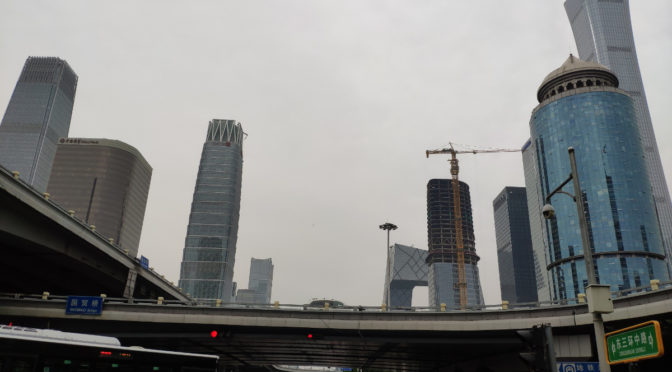I’ve done this type of post a few times before, notably in 2018 an 2019 in which I look at some of the things that I’ve seen change over the year in Beijing and in parts of China. Although the current situation has China and the world dealing with the Coronavirus epidemic, things were normal until December. So, in that case, should I do this type of post again next year, it will be interesting to see how things have changed within that time. But, for now, let’s take a look at some of the things that have changed over the last year.
5G
Big buzzword these days, “5G this”, “5G that”. No longer just the “internet of things”, it’s now “5G fast”. Oook. And some people are already blaming the current virus outbreak on the implementation of 5G towers in cities. Although I do believe us folks will see health problems develop over time as the result of the implementation of different technologies (not jut WIFI but bluetooth and infrared, too), I doubt it causes a virus epidemic. Anyway, 5G has been implemented but most people I see are using older phones that don’t have 5G capability. That is to say, the technology is there but I don’t see people stocking up on smart home stuff or newer cell phones. Maybe I should visit more people?
Whatever the case may be, 5G is supposed to be this decade’s internet speed and connectivity. We’ll see how it unfolds over the next year and then throughout the decade until 6G becomes a thing. I kind of missed the 4G rollout in 2010 (I remember 3G and EVDO being a big thing) but I’m not sure it was as big of a deal. Not sure, did anyone really pay attention to that rollout or did they just expect their internet to be faster?
National networks
An expansion of share bikes has made it possible to find good quality bikes all over Beijing and, increasingly, throughout China. One of the things China has been doing is nationalizing a lot of its transport card networks, such as subways and buses. Although Alipay and WeChat continue to be the primary methods of payment throughout China, the country still uses transport cards so people can pre-pay.
The share bike system is an especially cheap method of transport. I recently bought a six-month pass for about 80 RMB (~$16 CAD). I’ve also noticed that the bikes have better latches that are easier to undo and shift the seating position. Finally, it seems that these share bikes have been consolidated into one or two companies now, notably Alipay (owned by Alibaba) and Didi, which is owned by Tencent. Ofo is still out there but I think it’s been bought out, so too with MoBike.
China’s Electric car
I wrote about this last year but I’ve seen more of them on the road lately. China’s Tesla-equivalent: the Niu. Last year I wrote it as “Riu” but I think that’s incorrect. Anyway, more of these cars are on the road probably because it’s easier to secure a driver’s license if you buy an electric car rather than a gas-powered car. By doing so it “helps” the environment. I’m not sure if the same restriction on which days you can drive applies to electric cars or if that’s only for gas-powered cars.
Virus Outbreak
First, of course, the Coronavirus hit China hard in January of 2020. It’s the Year of the Rat and so many older people say something always bad happens. They were right.

https://gisanddata.maps.arcgis.com/apps/opsdashboard/index.html#/bda7594740fd40299423467b48e9ecf6
Why do I mention this if it’s so obvious?
Because the new “hygienic measures” are some of the things I’d like to keep track of over the next year. I’ve said it myself that wearing a face mask is part of the Asian culture but I’ve had Chinese people counter me and say that it’s not. Instead, they say that people only started wearing masks in the early 2000s because of all of the pollution generated by the factories. So, going forward, we’ll see if people continue to wear masks as faithfully as they do now or if these will go by the wayside.
That being the case, right now things are returning to “normal”, although some of the smaller kiosks seem to have been abandoned. I mentioned before that I wouldn’t consider things to be completely normal until some of these small newsstands re-opened. Well, they have in some of the busier parts of the city but not everywhere. I wonder if their owners gave up on them. Likewise with the morning breakfast food cart that has been shut down and re-opened a few times in the last year.
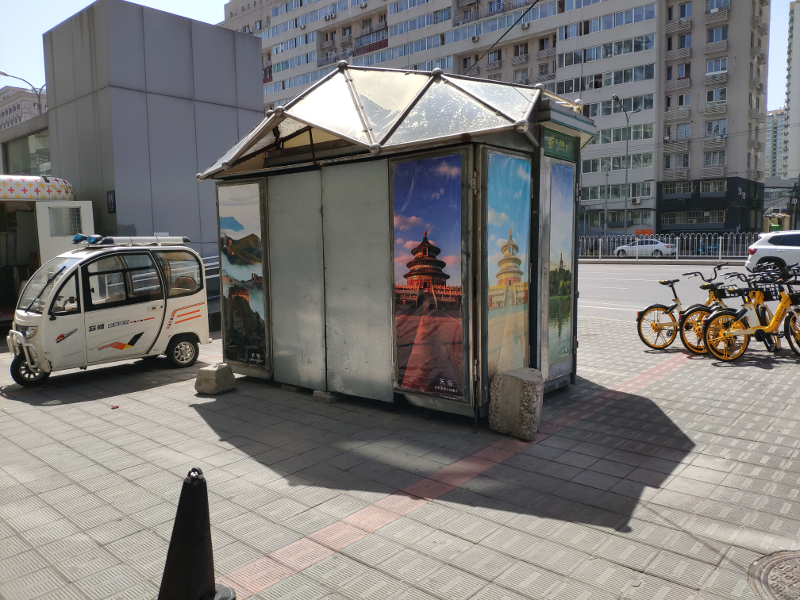
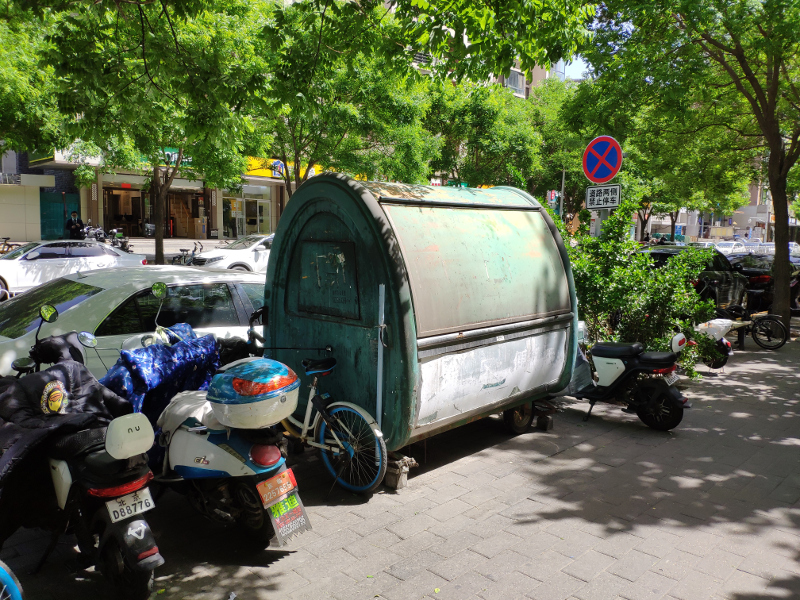
New hygienic measures
So, what are some of these new “hygienic measures”? No more spitting, keep your distance, wash your hands after you use the toilet, no smoking, wear a mask when around a lot of people. There might be more but those are the ones I see being advertised.
Oh, and HIV and Herpes!
There is some belief that both of these viruses are bit more prominent in China than the official numbers let on. Not that I’ve experienced them (thankfully!) but I do see STI and STD testing being advertised a bit more. Few toilet stalls have ads for these tests but I have seen testing being advertised in some elevator ad screens.
This might seem obvious to most other places but you have to keep in mind that talking about sex and related stuff is kind of, well, not done in China. If you ever get the chance, with some discretion and tact, inquire about the sex education received in school. Even if you’re a guy you’d be wondering, “But, you were told more, right?” Often not.
So where do Chinese people learn a lot about sex and related subjects?
TV!
Sex and the City. Desperate Housewives.
Thank goodness for Hollywood!
To be fair, it’s not like China is alone in this situation. There is a joke going around in which a Father says to his son, “Alright, son, time to talk about sex.” To which the son replies, “Alright, Dad, what do you want to know?” Implying that the son has already learned everything from the internet and is probably more aware of sexuality than his Father.
Luckin Coffee gets Unlucky
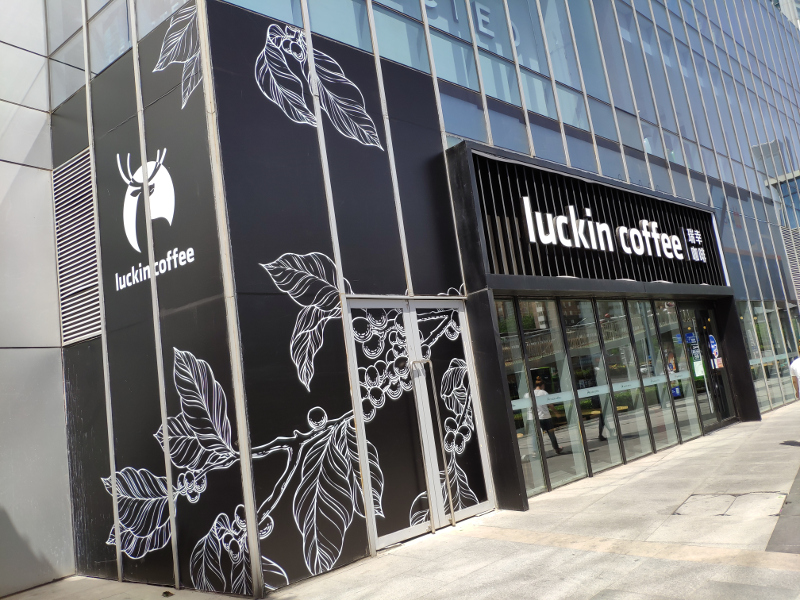
Last year I wrote about the increasing prominence of a Starbucks competitor here in China. I also wondered how the company would stay in business since they were selling at steep discounts, often a buy-one-get-one deal. And free delivery. Well, that seems to have changed as the company recently got slammed with fraud charges as some big stock shorting firms in the USA went after Luckin. Then it turns out the company has been fabricating its sales numbers for the last half year (since I wrote actually!) And so the govt here has laid a heavy hand upon them but the stores remain open.
Beijing Culture and Media
Speaking of fraud, another company recently had its CEO take off with a bunch of company money. Beijing Wenhua, which is a media company that put out The Wandering Earth and a few other famous Chinese movies. Apparently the CEO took the Coronavirus outbreak as a chance to flee the country. Who knows where he went or what will happen to him but the company’s stock price took a dive. In looking at their website (http://www.bjwhmedia.com/) it seems they have a few things going for them so I doubt the company will be down and out. It’ll be just like switching out CEOs!
Beijing Ourhours Markets to close
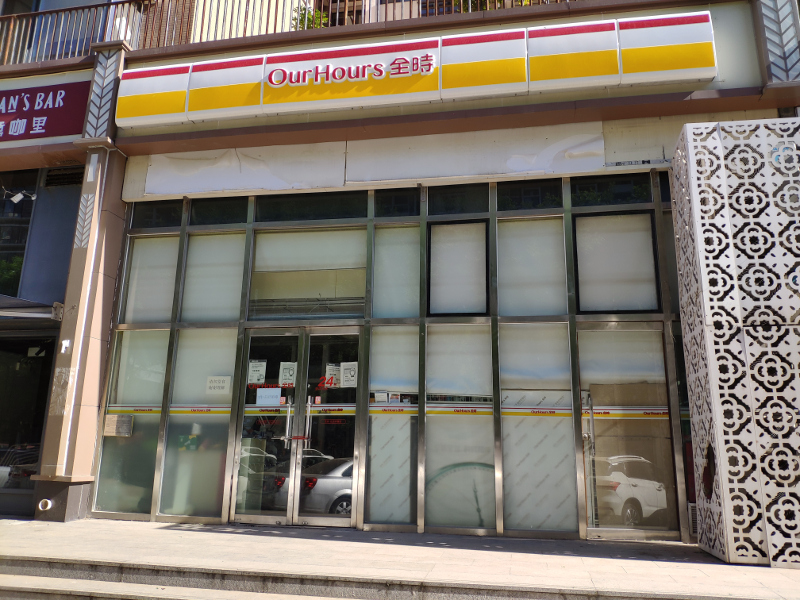
Although incredibly convenient, one has to wonder how some stores make money. Well, the latest news is that the Beijing branches of Ourhours mini-markets will close on May 20th. Why? They’re not making money.
This isn’t really a surprise since there are so many mini markets all over the place. The latest competitor is the “B” mini-markets, whose name I actually don’t know but the letter they use looks like the “Bitcoin B”. So, goodbye to Ourhours, I’m sure there will be another very soon after.
This seems to be rather common in China: setting up a competing store and then slashing prices in an effort to draw customers. But it’s a race to the bottom as people keep going to the cheaper place or to whatever is the most convenient. It’s not like these places sell anything different, they’re often selling cheap stuff or, worse still, knock offs.
Fake Alcohol
You can taste the difference right away but even before you buy, if the price is too good to be true, it probably is. And, check the labelling. How does the English read?
Gyms don’t survive
Not much of a gym-going culture, but that is changing a little bit. Expensive gyms offer a similar experience as a hotel fitness center (without the pool). Cheaper gyms may not survive a year or more. Since you have to pay all at once, it’s not worth the risk!
Garbage sorting
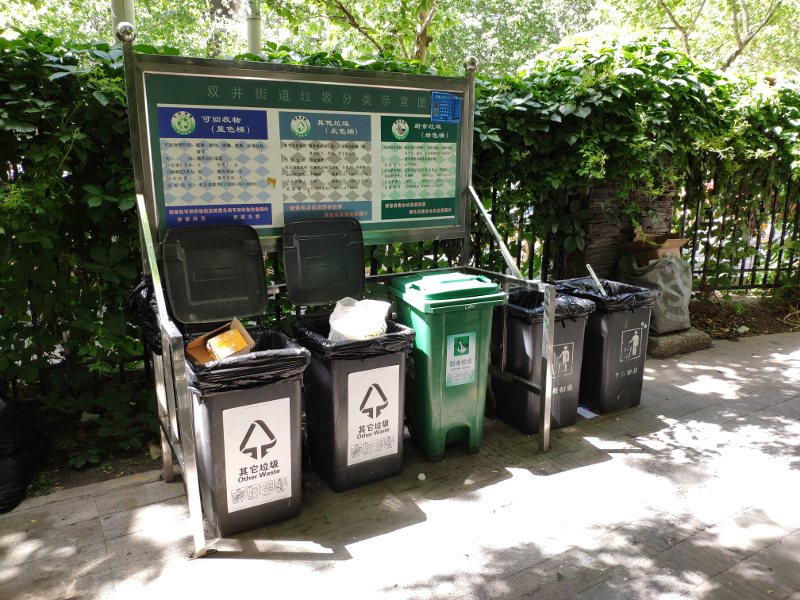
China has stepped up its efforts to show that it is dealing with environmental pollution, particularly that caused by human consumption, by that I mean: garbage.
It’s not unusual to see delivery folks speeding around the city with insulated hampers on the back of the bikes, charging through gates, into elevators or up stairs to make their food deliveries. It’s a huge business. It also generates a lot of waste.
Some stores have moved to paper straws in tandem with the USA social media outlash on plastic straws. But that hasn’t stopped plastic bag usage or other disposable items. And before we could just throw it all away and let the garbage people deal with it.
Now we have to make efforts to actually sort the garbage ourselves.
There are several bins, such as Recyclable / Non-Recyclable, Other, and Kitchen Waste. They recently removed all of the garbage bins from the compound I live on and have instead put four bins outside. Are these large bins? No, not at all!
So, although we have to sort our garbage, there’s still so much of it that now the garbage lady has to sort it outside rather than inside. I’m not sure how this is going to work.
Why does she sort the garbage?
Because, even though we the people have to sort out garbage, all of that garbage still has to go to different places, which requires bundling and then shipping. They were doing this anyway. The garage lady used to to go through the trash three times a day (5 am, 10 am, 5 pm or thereabouts, as far as I could tell) and in those three trips she would sort the plastic bottles, cardboard and other garbage that was thrown out. She would receive help from time to time, though I didn’t notice any consistency in her helpers, just that sometimes she had them.
So, in effect, she sorts the garbage for the building. Each building has someone who does this. And given the size of the building and that she’s the only one doing it, it’s a lot of work. So, this whole garbage sorting mandate now means that instead of having garbage bins on each floor, it’s now put outside. Already I see people leaving garbage in lazy places along the way!
The big change, then, is kitchen waste, which I don’t see anyone dealing with. I’m sure there is a bin but it doesn’t look like people are filtering out their food waste. However, to be clear, I have seen restaurants and I recall seeing the university cafeterias removing kitchen waste in large barrels. So it was being dealt with by the businesses and restaurants. I don’t know how this will be enforced within the apartment compounds.
I also wonder how the garbage lady is going to sort the trash in the winter months.
Costs in the supermarket
And following last year’s price lists, I’ve noted some of the current prices of stuff in the supermarket. One problem with a list like this is that there is often a price difference between the larger and smaller shops and then also the imported or domestic supermarkets. So use these prices as a guide:
- Eggs 4 RMB per 500g
- Imported Milk 9.90 RMB (1L)
- Domestic Milk 12.50 RMB (1L)
- Qingdao beer 4.5 RMB (330ml)
- Yogurt 13.9 RMB (400g) (***Last year I have it listed as 7.50 RMB, I’m not sure if I wrote that down wrong)
- Steak 55RMB (500g)
- Water 8.5 RMB (4L), 10 RMB (5L)
- Internet 500 (year – hutong) to 1350 (year – newer community)
- Phone usage – 50 RMB per month seems to be typical, but more data can be added for another 25 RMB for 10 GB.
- TV 18 RMB / mth = 250 RMB / yr
- Rent – 7000 RMB per month (within the 3rd Ring Road)
- Bus ticket – 1-2 RMB (depends on distance)
- Subway – 3-6 RMB (depends on distance)
- Starbucks Grande Americano 31RMB, scone 14 RMB
Beijing CBD
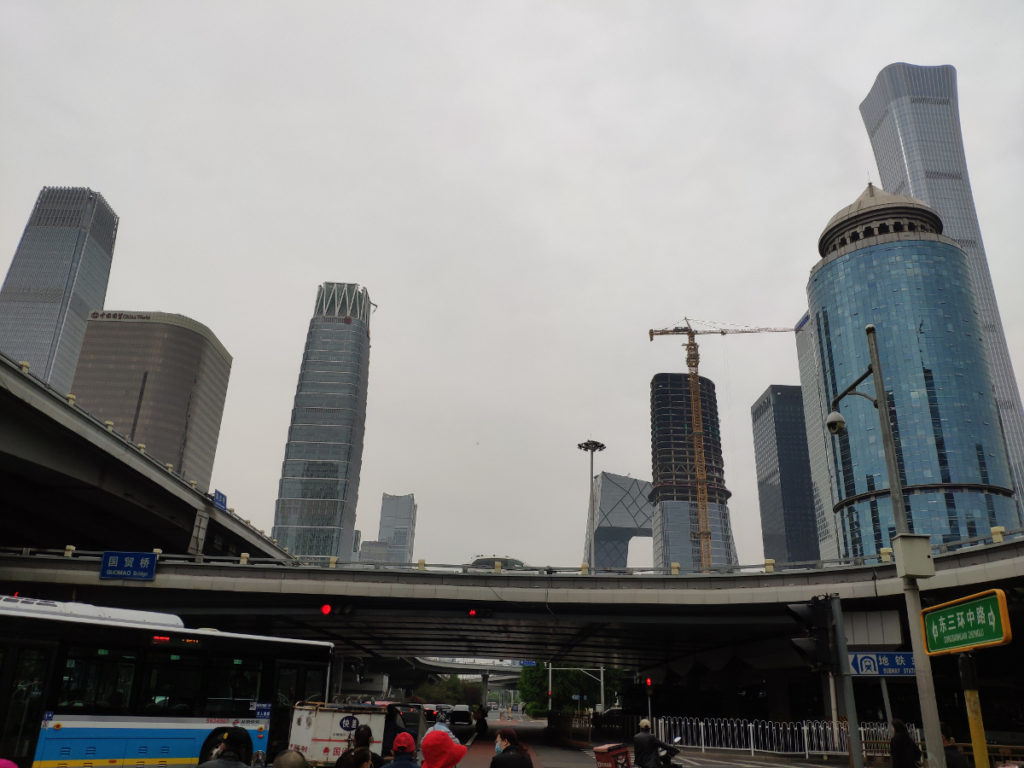
And things continue to be constructed in the middle of Beijing. I didn’t get to replicate the photo from last year but you can see one of the buildings in the photo below now has windows being added to it. The big change over the last year is that the CITIC Tower has now opened.
Airpods everywhere
Whatever the trade war or goings on, it appears that a lot of people have the Airpods, Apple’s flagship bluetooth ear phones. I’m not sure which type they have (I don’t look that closely into people’s ears) but a lot of people have those little white dots stuck into their ears. We’ll see if that continues over the next year or so.
